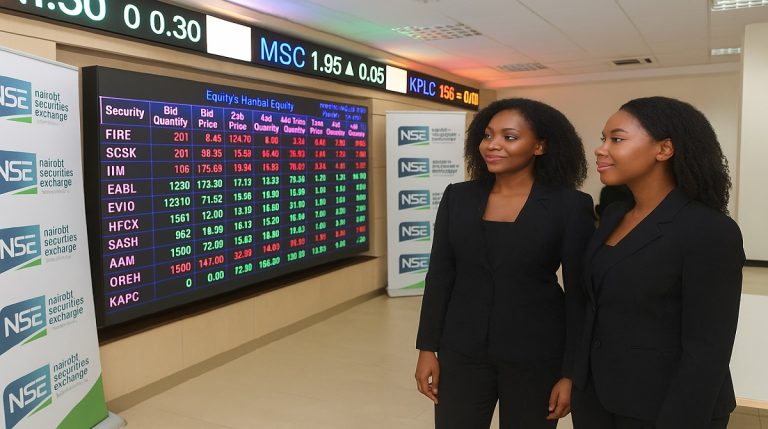What if the next frontier for wealth creation isn’t in Silicon Valley or Wall Street, but in the heart of Africa? The Nairobi Securities Exchange (NSE) has quietly evolved into one of the most promising gateways to frontier and emerging market investments. So, how do you buy shares on NSE.
As Kenya positions itself as an economic hub in East Africa, savvy investors both local and international are asking a critical question: How do you buy shares, Exchange Traded Funds (ETFs), and Real Estate Investment Trusts (REITs) on the NSE?
The process might seem complex, but in reality, it’s a strategic play with potentially outsized returns. Here’s a data-driven look at the step-by-step approach, why it matters now more than ever, and how forward-thinking investors are capitalizing on it.
Kenya’s capital markets have matured dramatically over the last decade, offering a blend of stability, innovation, and growth potential. According to the World Bank, Kenya’s GDP growth rate averaged 5% annually over the past decade, driven by technology adoption, infrastructure development, and regional trade integration.
The NSE isn’t just about shares, it’s a multi-asset platform for equities, ETFs, and REITs. ETFs like the Satrix MSCI World Feeder ETF provide Kenyan investors with global exposure without leaving the local market. REITs, on the other hand, offer exposure to the booming real estate sector without the complexity of direct property ownership.
For global investors, this is more than diversification; it’s about capturing alpha in an underpenetrated market. Yet, the question persists: How do you start?
How to Buy Shares on NSE: A Strategic Roadmap for Investors
The NSE has streamlined its processes, making entry easier than ever. Here’s the six-step playbook every investor needs to understand:
1. Open a CDS Account.
The Central Depository and Settlement (CDS) account is your first step, functioning as a digital vault for your shares.
Action Steps:
Select a licensed broker or bank (the NSE website lists all approved participants).
Provide essential documents: National ID or passport, Kenya Revenue Authority (KRA) PIN, and a passport photo.
Complete the CDS1 form, guided by your broker.
Why It Matters:
The CDS account eliminates the era of physical share certificates, enabling secure, efficient, and transparent transactions.
2.Fund Your Trading Account
Once your CDS account is active, you need liquidity to trade.
Transfer funds to your broker’s client account via bank deposits or mobile money (popularly M-Pesa in Kenya).
Confirm payment details with your broker to avoid fraud.
Pro Insight:
Many brokers now integrate mobile payment systems, making the funding process near-instant. This aligns with Kenya’s leadership in mobile money innovation.
3.Select the Right Shares, ETFs, or REITs
Here’s where research meets strategy.
Use the NSE platform to explore listed companies and ETFs.
Review fundamentals: price-to-earnings ratios, dividend yields, and sector performance.
Decide your capital allocation; don’t bet it all on one stock.
Case Study:
Investors who bought Safaricom shares during its 2008 IPO at KES 5 per share have seen returns exceeding 700%, making it one of Africa’s most iconic equity stories.
4.Place a Buy Order
The digital age has simplified execution:
Use web portals, mobile apps, or even USSD codes provided by brokers.
Choose between:
In the fast-paced world of trading, knowing your order types can make all the difference: a Market Order lets you buy instantly at the best available price, while a Limit Order allows you to set your own price and wait for the market to come to you. Pro tip: when dealing with volatile stocks that swing wildly in seconds, limit orders are your secret weapon to avoid overpaying and keep your strategy sharp.
5.Order Execution
Trades are matched on the NSE platform within its trading window; 9:30 AM to 3:00 PM, Monday through Friday.
Expect near-real-time confirmation from your broker once the order is executed.
6.Settlement (T+3)
The settlement period in Kenya is T+3, meaning your shares are credited to your CDS account within three business days.
Why NSE Could Be Your Next Big Bet
Africa is often described as the world’s last frontier for investment and with good reason. According to the African Development Bank, Africa’s combined consumer and business spending will reach $6.7 trillion by 2030. Kenya, with its tech-forward economy and growing middle class, sits at the center of this narrative.
What makes the NSE a magnet for global investors? Number one is undervalued gems, many NSE-listed companies are trading at bargain valuations compared to their global counterparts. Another reason is Smart diversification, MSCI feeder ETFs offer seamless global exposure without the headache of currency risks. Lastly is Real estate boom, REITs open the door to Kenya’s fast-growing property market, fueled by rapid urbanization and surging housing demand.
Actionable Insights for Investors.
For investors and entrepreneurs eyeing frontier markets, success lies in strategy: think long-term, volatility is inevitable, but so are outsized rewards; diversify beyond borders with ETFs and REITs for a safer, balanced play; tap into mobile innovation, Kenya’s cutting-edge mobile money ecosystem makes investing faster and more seamless than in many developed markets; and stay sharp on policy trends as the Capital Markets Authority’s ongoing reforms promise deeper liquidity and greater foreign investment opportunities.
Key Takeaway: Is Now the Time to Act?
In a world where developed markets are saturated and yields are shrinking, frontier markets like Kenya offer a rare combination of growth potential and accessibility. The NSE isn’t just a stock exchange, it’s a springboard into one of the most dynamic economies in Africa.
The real question is: Will you be an early mover, or will you wait until the rest of the world catches on?
Do you have any story or press releases you want to share? Send tips to editor@envestreetfinancial.com
Follow us on Twitter, Facebook, or LinkedIn to ensure you don’t miss out on any

